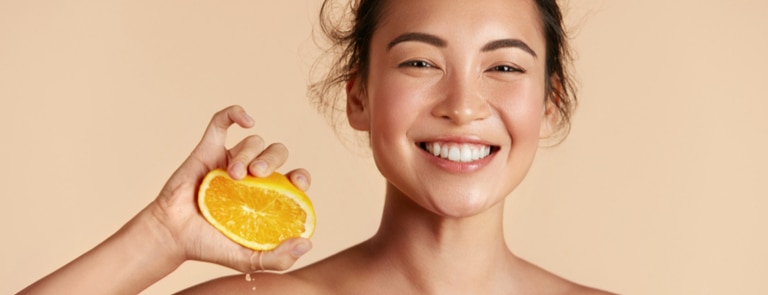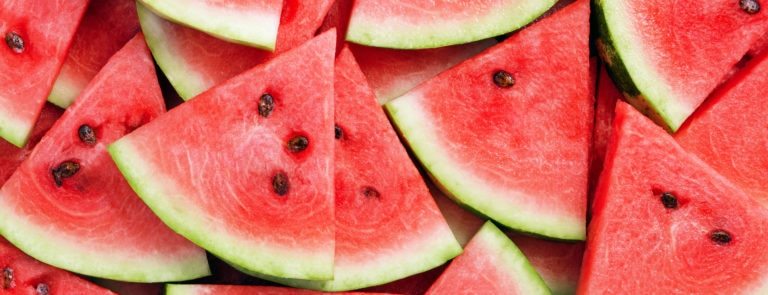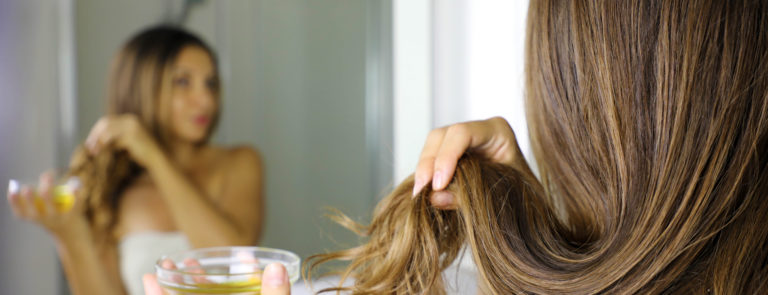10% off £35
10 best vitamins for healthy skin

While your skincare routine plays a part in your skin’s condition, a nutrient-packed diet works wonders to maintain healthy skin from the inside out.
But what actually helps?
There’s half an alphabet’s worth of vitamins to get your head round, and it can be confusing to understand which will benefit you most.
Here is our guide to the 10 essential nutrients that can help you achieve healthy skin that looks and feels good.
Importance of skin health
Our skin is what protects our insides from external dangers.¹ That’s everything from the weather and pollution to sharp, hot, or cold items.
So, it only makes sense that we look after it. One way we can support our body’s largest organ is by making sure we eat and apply the vitamins it needs to stay healthy.
Signs of poor skin health
If our skin is unhealthy, it usually gives us “warning signs” to let us know it’s feeling down in the dumps.
In fact, our skin can sometimes tell us if there is something going on inside that we need to address.
Here are the top signs of poor skin health:
- Premature ageing
While skin ageing is natural (imagine if you looked like a baby forever!), you can sometimes experience wrinkles and sagging earlier than expected.
Premature ageing could be a sign that your skin isn’t at its healthiest, or other factors (like UV exposure, smoking, stress, or pollution) could be at play.
- Dark circles
Dark circles can appear for many different reasons. The most obvious is tiredness, but you might also experience dark circles because of:
- Allergies
- Dehydration
- Ageing
- Your genetics
There are also some medical conditions, like iron deficiency and thyroid issues, that can be associated with dark circles under your eyes.²³
- Dull complexion
If you’re lacking shine, it could be a sign that your skin is dehydrated. Drink plenty of water – 6 to 8 glasses per day – and moisturise daily.⁴
A buildup of dead skin cells can also result in dull-looking skin. Be sure to exfoliate regularly to help shift these and keep your skin glowing.
- Blemishes
Again, blemishes can be triggered by many different things. Some of these – like hormones – may not be as easily controlled as others.
However, blemishes are usually a sign that your skin is feeling congested and could benefit from a cleansing skincare routine.
- Dark spots
Dark spots, or hyperpigmentation, are the result of excess melanin production in your skin.
They can be caused by anything from acne scarring to hormone fluctuations (i.e. during pregnancy) – but they can also be a sign of sun damage.
Use a broad-spectrum SPF of at least 30 every day (even in the winter!) to protect your skin from harmful UV rays. UVA and UVB exposure are two leading causes of skin cancers.
- Itchy skin
Itchy skin is another symptom that could stem from many different things – but it’s always something to look further into.
You might have a skin condition like eczema or psoriasis.
However, it’s also linked to jaundice, which can be a sign of something more serious like liver disease.⁵
The occasional itch should be nothing to worry about, but it’s best to seek advice from your doctor to be sure.
Which vitamins are good for the skin?
Everyone’s skin is different, and we all have different skin goals.
Thankfully, there are a wide range of vitamins and other nutrients that can help with most common skin complaints:
Vitamin A
A collective term for a group of fat-soluble nutrients, our bodies use vitamin A to reproduce and grow cells.
This is particularly important for our skin, as it has a high cell turnover.⁶
You can find vitamin A in foods like oily fish, eggs, and liver. If you’re not a fan of offal, include spinach, carrots, and sweet potatoes in your diet instead.
These are all good sources of beta-carotene, which our bodies convert into vitamin A.
Vitamin A is the key ingredient in retinol, widely thought to be a wonder product for youthful, smooth skin. This is because vitamin A accelerates skin cell turnover, helping shed dead skin cells and revealing fresh new skin underneath.⁷
The enhanced cell stimulation increases elastin and collagen production that can make skin look and feel plumper and more youthful.⁷
Using vitamin A in your skincare routine could help to minimise the appearance of blemishes, fine lines, hyperpigmentation, and wrinkles.
However you should not use retinoids or any vitamin A derivative (or consume too much vitamin A in your food) if you’re pregnant, as an excess of vitamin A can harm an unborn baby.⁸
Always check with your GP or dermatologist if you’re unsure about your diet or skincare routine while pregnant. Handpicked content: Why your skin loves vitamin A
Vitamin C
Vitamin C is essential for our normal collagen formation. Our bodies can’t make vitamin C, which is why it’s so important to include it in your diet.⁹
What’s more, vitamin C is water soluble. This means that it’s easy to take and easy for our bodies to transport to our tissues, but it’s not stored very well.
Excess vitamin C is excreted out through our urine, so it’s important we replenish those levels every day.
Without vitamin C, our bodies simply wouldn’t be able to make enough collagen, which is key for keeping our skin’s elasticity and plumpness. Deficiencies can lead to premature skin ageing like fine lines and wrinkles.
Luckily, this essential vitamin is found in a wide variety of fruits and vegetables, including:
- Oranges
- Strawberries
- Broccoli
- Potatoes
You might also want to use it in your topical skincare, in a moisturiser or serum, where it can help tackle blemishes and brown spots.¹⁰
Its antioxidant properties help disarm free radicals, harmful unstable atoms which can contribute to poor skin health and premature skin ageing.¹¹
Vitamin D
Vitamin D is one of the most important vitamins for our overall health. It helps to support our bones, brain, heart, muscles, immune system, and skin.
Its main skin benefits include:
- Calming sensitive skin
- Normalising skin cell turnover
- Protecting the skin barrier (epidermis)
Vitamin D deficiency can impact your whole body, but on your skin it might increase your risk of psoriasis and atopic dermatitis (AD).¹²
The NHS recommends that everyone needs 10mcg of vitamin D a day, which is relatively easy to obtain if you spend time soaking up the sunshine.¹³
But it’s recommended you take a supplement all year round! We don’t get enough of the right wavelength of sunlight for half the year to naturally fill our vitamin D requirements.
Be sure to use an SPF of 30+ all year round, too. The sun may not be shining, but its UV rays are still dangerous on cold and cloudy days.
Vitamin E
Vitamin E is an important fat-soluble antioxidant and has been used in dermatology for more than 50 years.¹⁴
It helps protect cells from oxidative stress caused by UV exposure, pollution, and our natural cell degeneration.
Thanks to vitamin E, your skin cells stay better protected against premature ageing and wrinkles, and it may also help to improve the appearance of scars and blemishes.
Vitamin E comes from plants – so it can only be obtained through your diet or skincare. Some of the richest food sources are nuts, spinach, olive oil, and sunflower oils.
You’ll also find vitamin E in skincare products such as serums, moisturisers, and body lotions. It’s most popular in healthy ageing skincare, but most of its skin benefits come from consuming it via your diet.
B vitamins
Four of the most beneficial B vitamins for skin health are B2, B3, B5, and B7:
Vitamin B2
Vitamin B2 is also known as riboflavin, and is responsible for keeping the skin, eyes, and nervous system healthy. You can find B2 in dairy products like milk and eggs, along with fortified breakfast cereals.¹⁵
Vitamin B3
Vitamin B3, or niacin, is a water-soluble vitamin we must get through our diet.¹⁶ Our bodies make a tiny amount, but we need to supplement the rest.
Studies have shown that niacin could potentially help improve the appearance of ageing facial skin, namely by reducing red “blotchiness” and hyperpigmented spots.¹⁷
Niacin not only plays a part in healthy skin, but it helps to release energy from the foods we eat.¹⁶
A vitamin B3 deficiency can result in dry skin, or in very severe cases it can develop into pellagra – a condition that produces sore, “raw”-feeling skin similar to sunburn.¹⁸ Remember the symptoms of pellagra by the three “D”s: ¹⁸
- Dermatitis
- Diarrhoea
- Dementia
Meat, fish, brown rice, and milk are all good sources of this essential nutrient.¹⁶
Vitamin B5
Also called pantothenic acid, B5 is another essential vitamin we need to stay at our best.
It’s known for its role in maintaining healthy skin, hair, and eyes.
You can find vitamin B5 in lots of natural foods like eggs, meat, dairy products, whole grains, broccoli, nuts, mushrooms, and more.¹⁹
Studies have found that pantothenic acid can help improve mild to moderate breakouts. A 2014 placebo-controlled study found that participants taking a B5-based dietary supplement had fewer skin lesions after 12 weeks when compared to their placebo counterparts.²⁰
Vitamin B7
Biotin is part of the B vitamin family and performs multiple important functions, including supporting healthy skin, hair, and mucous membranes.
Signs of biotin deficiency include skin rashes, hair loss, and brittle nails – which is why it is recommended for healthy skin.²¹
You can find it in a wide range of foods including eggs, fish, nuts, and whole grains.²¹
Handpicked content: Vitamin B complex: functions, foods, deficiency, and supplements
Iodine
Iodine is an essential mineral that helps our thyroid make hormones. These help to:
- Control your growth
- Support a healthy metabolism
- Repair damaged cells
Those with an iodine deficiency may have dry, flaky skin. One study found that dry skin affected up to 77% of people with low thyroid hormone levels.²²
This is thought to be because thyroid hormones help your skin cells to regenerate. If your skin doesn’t regenerate as often as it should, dull and flaky skin can build up.
You might also find that you sweat less due to changes in your sweat glands.²²
This trace element is found naturally in seawater, rocks, and some types of soil. If dining on a plate of soil doesn’t appeal to you, go for iodine-rich foods like fish, shellfish, and kelp.
If you are vegan or vegetarian, you may wish to take a supplement instead. However, be careful that iodine is not already supplemented in any other vitamins you take.
Iodine is a trace element: you only need a tiny amount and an excess can be harmful. Taking high doses of iodine for a long time could change the way your thyroid works.²³
You might already be taking iodine in your general multivitamins, so be sure to check the labels before adding any new supplements to your routine.
Iron
You might associate low iron with fatigue and dizziness – but iron deficiency can also contribute to dry, itchy skin.²⁴
It also has a close (and confusing) relationship with your thyroid:
- Hypo- and hyperthyroidism can cause iron deficiency
- But iron deficiency can also cause hypothyroidism
So, it can be difficult to work out where the circle begins.²⁵
Incorporating lots of iron-rich foods, like fish, green veg, beans, and eggs into your diet will ensure you’re consuming enough iron. It will also help keep your skin looking healthy and hydrated and help to minimise the appearance of bruises.²⁶
However, if you suspect you’re still deficient, speak to your GP.²⁷
Omega 3
Omega 3 is most often associated with heart health and cholesterol reduction – you might know it from fish oil.
Omega 3s appear to improve the function of the skin barrier (epidermis), helping to seal in moisture and keep out pollutants.²⁸ ²⁹ This can contribute towards more hydrated skin and less congestion – potentially reducing breakouts and blemishes.
Studies have also shown that supplementing with DHA and EPA (two long-chain omega 3s) may reduce skin’s sensitivity to UV rays.³⁰
Increase your omega 3 intake by eating oily fish, vegetable oils and margarines, green leafy vegetables, nuts, and seeds.³¹
Selenium
This lesser-spoken-about mineral may play a role in soothing red, sensitive skin and help to calm the effects of breakouts and skin conditions like eczema.³²
Selenium is an antioxidant that works to protect other antioxidants like vitamin E.³²
You’ll find selenium in meats, grains, fish, and nuts like Brazil nuts and walnuts.³³ Selenium content can depend on your location and soil conditions – so bear this in mind.
Extremely high levels of selenium can cause severe health problems and may potentially even increase your risk of skin cancer.³⁴³⁵ You may already be getting enough through your diet, so it’s always best to check with your GP before taking selenium supplements.
Zinc
Zinc helps your skin heal after an injury. It keeps cell walls stable and is also needed to produce structural proteins such as collagen.
It can also play a part in clearing acne; one study found a 49.8% reduction of blemishes in participants taking 30mg of topical zinc for 12 weeks.³⁶
Zinc is a trace element, meaning you only need a tiny amount of it – yet the World Health Organisation (WHO) estimates that 30% of the global population are zinc deficient.³⁷
A zinc deficiency can look like eczema, but it won’t get better with moisturisers and steroid creams.
Increase your zinc intake by eating meat, shellfish, dairy products, and wheat germ, or by taking a daily zinc supplement. Handpicked content: Why take zinc supplements?
Water soluble, excess is excreted, cannot be made by the body- will need a reference for this
https://lpi.oregonstate.edu/mic/health-disease/skin-health/vitamin-C
Ensure to recommend SPF usage; we don’t get enough of the right wavelength of sunlight for half the year; in general supplementing vitamin D is recommended
Multivitamins for skin health
As you can see, there are quite a few vitamins that help keep your skin nice and healthy.
If you’re considering supplementing more than one of them, it may be worth considering a multivitamin.
All multivitamins contain differing amounts of vitamins and minerals, so always check the product details or labels to make sure it has what you want in it.
Be sure not to over-supplement. For example, if you’re taking vitamin B2 supplements and a multivitamin, be sure that the multivitamin does not also have vitamin B2 in.
You could even look out for multivitamins with a skin health focus. Alongside healthy skin habits, such as:
- Staying hydrated with water
- Regular exercise
- Reducing your sugar intake (as this may contribute to acne or signs of premature ageing)³⁸³⁹
- Considering a daily prebiotic or probiotic in your diet or skincare routine⁴⁰⁴¹
a daily vitamin regime can help provide you with the goodness needed to support glowing skin.
Emma Gunns: The power of failure
Emma Gunns: The power of failure
In this powerful and honest conversation, Emma talks about the power of failure. With her extensive knowledge of beauty, she talks about:
- The two types of beauty personalities.
- The best beauty skincare ingredients that work for everyone.
- Her personal weight loss story.


The advice in this article is for information only and should not replace medical care. Please check with your GP or healthcare professional before trying any supplements, treatments or remedies. Food supplements must not be used as a substitute for a varied and balanced diet and a healthy lifestyle.
Before taking any supplements or minerals, it’s best to make sure you’re getting all the nutrients through your diet first. Food supplements must not be used as a substitute for a varied and balanced diet and a healthy lifestyle. If you have sensitive skin, eczema, psoriasis, acne or rosacea, consult a dermatologist before trying any treatments.
It is important to always check with your doctor or midwife before taking any supplements while pregnant. If you are pregnant, breastfeeding, taking any medications or under medical supervision, please consult a doctor or healthcare professional before use.
Last updated: 20 July 2022
- https://www.ncbi.nlm.nih.gov/pmc/articles/PMC2843412/
- https://www.ncbi.nlm.nih.gov/pmc/articles/PMC6042186/
- https://www.verywellhealth.com/under-eye-bags-5087308#
- https://www.nhs.uk/live-well/eat-well/food-guidelines-and-food-labels/water-drinks-nutrition/
- https://www.nhs.uk/conditions/jaundice/
- https://www.hsph.harvard.edu/nutritionsource/vitamin-a/
- https://www.ncbi.nlm.nih.gov/pmc/articles/PMC6791161/
- https://www.nhs.uk/conditions/vitamins-and-minerals/vitamin-a/
- https://lpi.oregonstate.edu/mic/health-disease/skin-health/vitamin-C
- https://www.ncbi.nlm.nih.gov/pmc/articles/PMC3673383/
- https://www.ncbi.nlm.nih.gov/pmc/articles/PMC3249911/
- https://www.karger.com/Article/Fulltext/485132#
- https://www.nhs.uk/conditions/vitamins-and-minerals/vitamin-d/
- https://www.ncbi.nlm.nih.gov/pmc/articles/PMC4976416/
- https://ods.od.nih.gov/factsheets/Riboflavin-HealthProfessional/
- https://www.hsph.harvard.edu/nutritionsource/niacin-vitamin-b3/
- https://pubmed.ncbi.nlm.nih.gov/12100180/#
- https://www.ncbi.nlm.nih.gov/pmc/articles/PMC4019925/
- https://ods.od.nih.gov/factsheets/PantothenicAcid-Consumer/
- https://www.ncbi.nlm.nih.gov/pmc/articles/PMC4065280/
- https://ods.od.nih.gov/factsheets/Biotin-HealthProfessional/
- https://www.ncbi.nlm.nih.gov/pmc/articles/PMC2895281/
- https://www.nhs.uk/conditions/vitamins-and-minerals/iodine/
- https://my.clevelandclinic.org/health/diseases/22929-anemia-rash
- https://www.verywellhealth.com/fixing-low-iron-thyroid-3232716
- https://www.unilab.com.ph/hemarate-fa/learn-more/articles/the-glowing-benefits-of-iron-for-hair,-skin-&-body
- https://www.nhs.uk/conditions/vitamins-and-minerals/iron/
- https://www.ncbi.nlm.nih.gov/pmc/articles/PMC3133503/
- https://pubmed.ncbi.nlm.nih.gov/22123240/
- https://pubmed.ncbi.nlm.nih.gov/21569104/
- https://www.heartuk.org.uk/low-cholesterol-foods/omega-3-fats
- https://vitamedica.com/wellness-blog/zinc-and-selenium-for-acne/
- https://www.hsph.harvard.edu/nutritionsource/selenium/
- https://ods.od.nih.gov/factsheets/Selenium-Consumer/
- https://www.researchgate.net/publication/273041265_Selenium_Supplementation_and_Secondary_Prevention_of_Nonmelanoma_Skin_Cancer_in_a_Randomized_Trial
- https://aestheticmed.co.uk/site/featuresdetails/the-effect-of-zinc-on-skin#
- https://bmcnutr.biomedcentral.com/articles/10.1186/s40795-015-0026-6
- https://www.bad.org.uk/pils/acne/
- https://www.bbcgoodfood.com/howto/guide/will-sugar-make-you-old
- https://www.ncbi.nlm.nih.gov/pmc/articles/PMC6463098/
- https://pubmed.ncbi.nlm.nih.gov/24364369/














